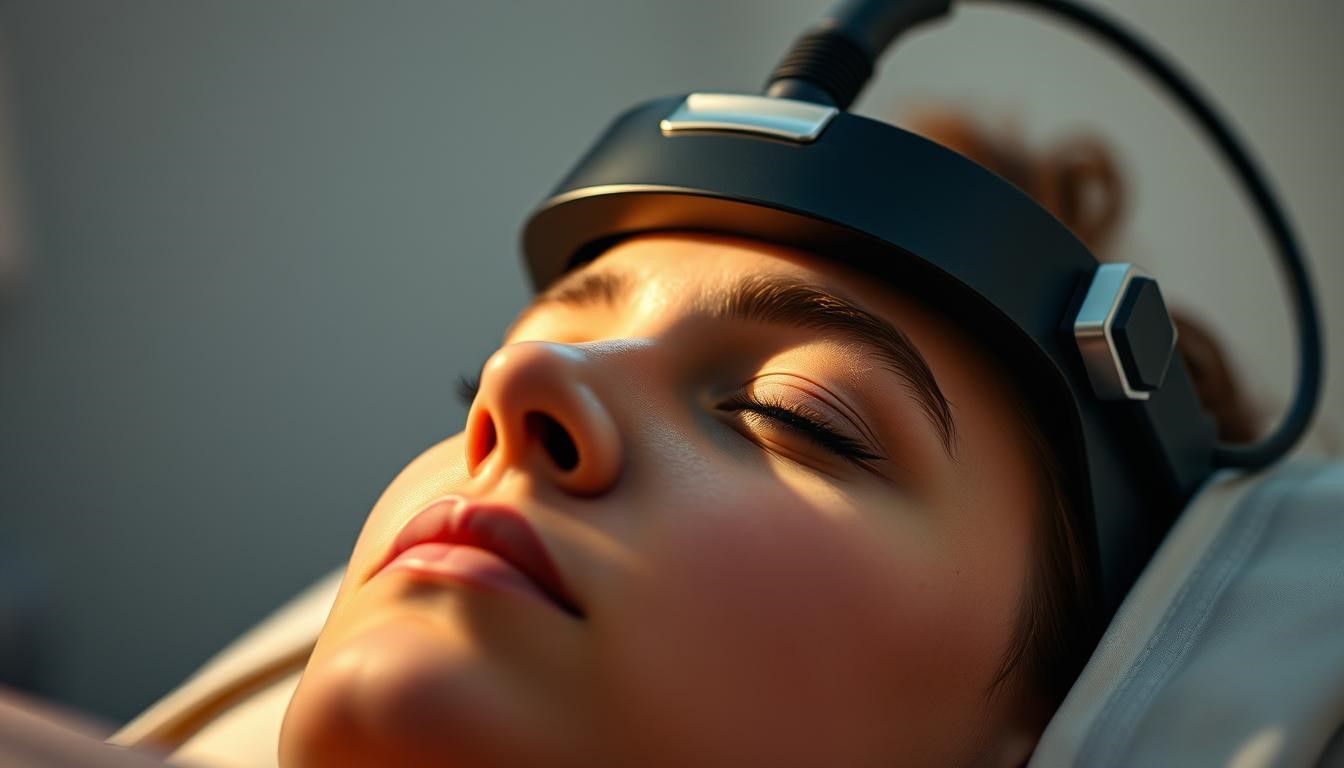Beat the Heat: Managing Summer Stress and Anxiety for Optimal Mental Well-being
The warm weather can be both good and bad. It's great for being outside, but summer heat can harm our bodies. It can cause sleep problems, feeling tired, and dehydration. These issues can make us feel more stressed and anxious.

At Revitalizing Remedies, our team knows how important mental well-being is in summer. We help people deal with stress and anxiety by taking action. This way, they can stay mentally healthy during the hot months.
Key Takeaways
- Understanding how summer weather affects mental health
- Identifying strategies for managing stress and anxiety
- Exploring resources for maintaining optimal mental well-being
- Learning effective coping mechanisms for the summer season
- Practicing self-care techniques for overall wellness
The Summer Mental Health Paradox
Summer is often seen as a time of joy, but it can also bring mental health challenges. The dream of a stress-free summer can turn into a reality of anxiety and stress. This creates a mental health paradox.
Why Sunny Days Can Trigger Unexpected Stress
Sunny days might lift our spirits, but they can also bring unexpected stress. Social pressures, vacation plans, and changes in routine can add to the stress. The Mental Health First Aid (MHFA) curriculum highlights eight dimensions of wellbeing. Ignoring any of these can increase stress levels.
The Body-Mind Connection in Hot Weather
Hot weather can affect our body and mind, making us feel irritable and anxious. Dr. Samantha Boardman, a psychiatrist, says, "The heat can make people feel sluggish and less motivated, impacting mental health."
"The body's response to heat
stress
can exacerbate feelings of anxiety and discomfort."
Let's look at how summer affects mental health:
| Dimension | Summer Challenges | Impact on Mental Health |
|---|---|---|
| Emotional | Heat-induced irritability | Increased anxiety |
| Social | Social pressures and events | Stress and feelings of overwhelm |
| Physical | Dehydration and heat exhaustion | Fatigue and decreased motivation |
Understanding these challenges helps us find ways to reduce anxiety and improve well-being during summer. By recognizing the complexities of summer mental health, we can prepare for and manage stress and anxiety better.
Common Summer Mental Health Challenges
Summer is often seen as a time to relax and have fun. But for many, it can also bring mental health challenges. Knowing these challenges is key to staying mentally well during the warmer months.
Reverse Seasonal Affective Disorder Explained
While Seasonal Affective Disorder (SAD) is often linked to winter, some face it in summer. Reverse SAD can cause anxiety, irritability, and restlessness. It's important to understand this to find ways to cope.
Heat-Induced Anxiety and Irritability Patterns
High temperatures can make anxiety and irritability worse. Studies show that extreme heat can increase stress, disrupt sleep, and worsen anxiety and depression symptoms. Staying cool and drinking plenty of water is crucial.
How Summer Disrupts Sleep and Emotional Balance
Summer can mess with our sleep due to longer days, heat, and routine changes. Poor sleep can lead to mood swings and irritability. Keeping a regular sleep schedule and a cool bedroom can help.
Our mission is to help our patients reach their full potential every day. By knowing the common
summer mental health challenges, we can take steps to keep our emotional balance and well-being.
| Challenge | Symptoms | Coping Strategies |
|---|---|---|
| Reverse SAD | Anxiety, irritability, restlessness | Stay hydrated, maintain routine |
| Heat-Induced Anxiety | Increased stress, anxiety | Stay cool, practice relaxation techniques |
| Sleep Disruptions | Poor sleep quality, mood swings | Establish consistent sleep schedule, cool sleep environment |
The Neuroscience of Heat and Psychological Stress
When it gets hot, our brains work harder to handle the heat. This affects our mental health. The link between heat and stress is complex and rooted in brain science.
Temperature's Effect on Neurotransmitters
Heat can change the balance of neurotransmitters in our brain. These chemicals help control our mood. Serotonin, a key one, is especially affected by temperature.
Studies show that high heat can lower serotonin levels. This can lead to more
stress
and anxiety.
- Heat stress can deplete serotonin levels.
- Lower serotonin levels are associated with increased anxiety and depression.
- Maintaining optimal serotonin levels is crucial for mental well-being during hot weather.
Latest Research on Climate and Mood Regulation
New studies show how climate change affects our minds. Rising temperatures can make mental health issues worse. They can even cause new problems.
Revitalizing Remedies offers new hope. They use FDA-approved treatments like Spravato and NeuroStar TMS. These help with depression and anxiety caused by climate stress.
- Understanding the link between climate change and mental health is crucial.
- Developing effective coping strategies is key to managing climate-related stress.
- Innovative treatments can offer significant relief for those affected by climate-related mental health issues.
Learning about the brain's response to heat helps us stay mentally healthy. This is especially important during the hot summer months.
Hydration Strategies for Mental Clarity and Emotional Stability
When it gets hotter, we lose more water. This makes staying hydrated key for our minds. Dehydration can make anxiety and depression worse and hurt our thinking skills. Our team works together to find the best ways to help, including drinking enough water.

Cognitive Consequences of Even Mild Dehydration
Even a little dehydration can affect how we think and feel. Studies show it can make it hard to focus, forget things, and change moods. Our brains are very sensitive to how much water we have.
Key cognitive consequences include:
- Decreased focus and attention span
- Increased irritability and mood instability
- Impaired memory and cognitive flexibility
Creating a Personalized Hydration Plan for Mental Well-being
Creating a hydration plan is more than just drinking water. It's about making healthy habits for our minds. First, check how much water you drink each day. Then, adjust it based on how active you are and where you live.
Tips for a successful hydration plan:
- Monitor your urine output to ensure it's pale yellow
- Incorporate hydrating foods into your diet, such as watermelon and cucumbers
- Avoid sugary drinks that can dehydrate you further
UV Safety and Its Surprising Impact on Mental Health
Sunlight is often linked to better mood, but there's a fine line between its benefits and risks for mental health. Sunlight can increase serotonin levels, helping to regulate mood. Yet, too much UV radiation can harm us.
The Dual Nature of Sunlight on Mood
Sunlight's impact on mental health is complex. It can lift our mood or cause stress. Sunlight boosts serotonin, which helps fight depression. But too much sun can cause discomfort, dehydration, and even skin damage.
Smart Sun Exposure for Optimal Psychological Benefits
To enjoy sunlight's mental health perks without risks, practice smart sun exposure. Spend time outside during less intense sun hours, like early morning or late afternoon. Use sunscreen and wear protective clothing to avoid skin damage. Moderation is key to enjoying sunlight's benefits without harming your health.
Your Summer Mental Health Toolkit: Practical Coping Strategies
As summer gets closer, it's key to have the right tools for stress and anxiety. Simple yet effective strategies can help you stay mentally well and enjoy the sunshine.
Mindfulness is a strong tool against summer mental health issues. Spend a few minutes each day on your breath and do things that make you happy. Drinking enough water is also vital, as it affects your brain. Make a plan to drink enough water all day.
Keeping a regular routine helps your mood and cuts down on anxiety. Create a daily plan with time for relaxation, exercise, and socializing. By focusing on
stress management and protecting your mental health, you can shine this summer and be your best self.
FAQ
How can I manage stress and anxiety during the summer months?
To manage stress and anxiety, keep a healthy routine. Eat well, exercise regularly, and get enough sleep. Drinking water and using relaxation methods like meditation can also help.
What is reverse seasonal affective disorder, and how can I cope with it?
Reverse seasonal affective disorder is depression in the summer. Keep a regular sleep schedule and stay cool. Find activities that make you happy. If it's hard, talk to a mental health expert.
How does dehydration affect mental health?
Dehydration can make you feel less focused and affect your mood. Drinking enough water helps keep your mind clear and emotions stable. Make a plan to stay hydrated.
What are some tips for smart sun exposure to boost my mood?
For the best mood boost from sunlight, go outside in the morning or late afternoon. Wear protective clothes and use sunscreen. This way, you enjoy sunlight safely.
How can I create a personalized hydration plan for mental well-being?
To make a hydration plan, think about your activity level and climate. Drink at least eight glasses of water a day. Adjust based on how your body feels. Include hydrating foods like fruits and veggies in your diet.
What are some healthy summer habits that can support mental health?
Healthy summer habits include staying hydrated and exercising. Also, reduce stress and sleep well. Eat a balanced diet and do things that make you happy.
How does temperature affect neurotransmitters and mood regulation?
Temperature can change neurotransmitters like serotonin and dopamine, which affect mood. Knowing how heat affects your mind can help you cope with summer stress.









